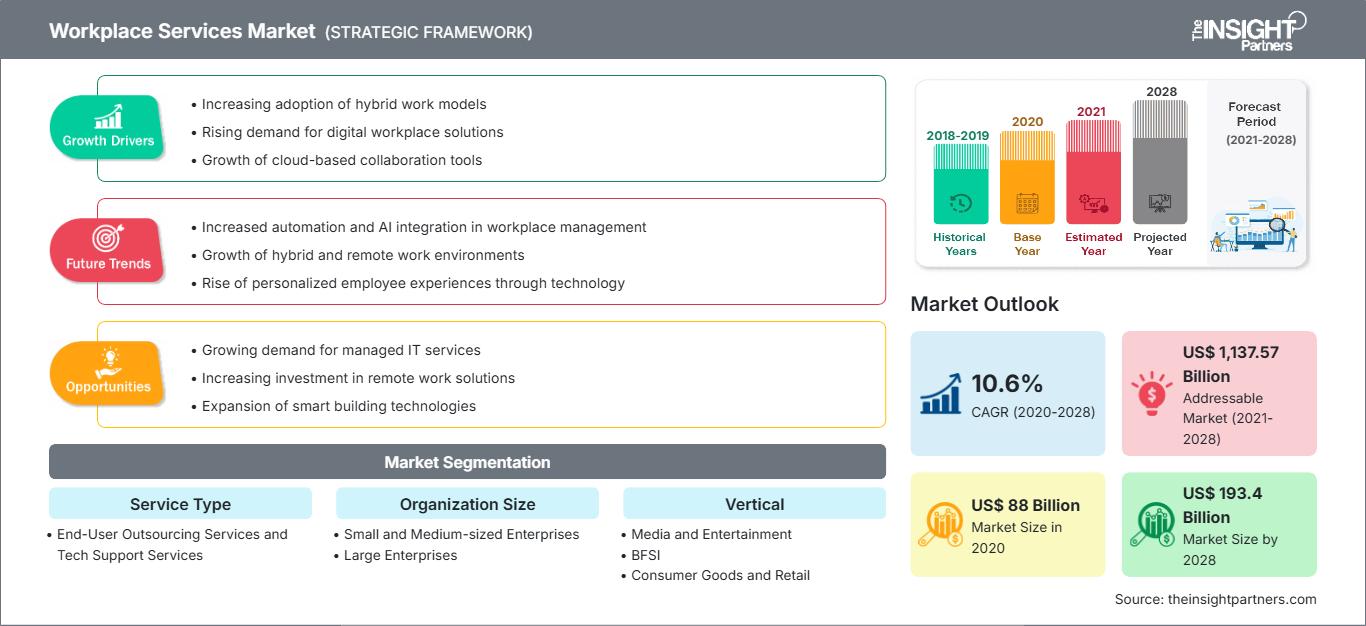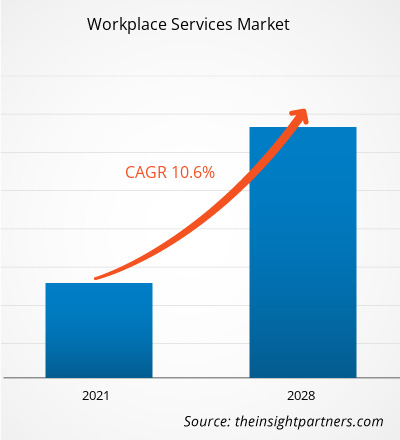Workplace Services Market Size and Competitive Analysis by 2028
Workplace Services Market Forecast to 2028 - COVID-19 Impact and Global Analysis By Service Type (End-User Outsourcing Services and Tech Support Services), Organization Size (Small and Medium-sized Enterprises (SMEs) and Large Enterprises), and Vertical (Media and Entertainment, BFSI, Consumer Goods and Retail, Manufacturing, Healthcare and Life Sciences, Education, Telecom - IT and ITES, Energy and Utilities, Government and Public Sector, and Others), Geography
Historic Data: 2018-2019 | Base Year: 2020 | Forecast Period: 2021-2028- Report Date : Apr 2021
- Report Code : TIPRE00011036
- Category : Technology, Media and Telecommunications
- Status : Published
- Available Report Formats :


- No. of Pages : 152
The workplace services market was valued at US$ 88.0 billion in 2020 and is projected to reach US$ 193.4 billion by 2028; it is expected to grow at a CAGR of 10.6% from 2021 to 2028.
Technology offers numerous advantages for business. An exponential growth in applications, devices, and networks is creating positive impact in the working culture. Safer work environments, hybrid workplace, additional cybersecurity, and globally dispersed workforce are some of the aspects contributing toward the concept of modern workplace, and thereby influencing the growth of workplace services. Therefore, the well-established IT infrastructure and small & medium and large enterprises across all the regions are demanding workplace services. Enterprises of all sizes are anticipated to invest in innovative and latest technologies to operate their business effectively. Enterprises across the world are using workplace services to boost their businesses and optimize their business efforts to ensure the lowest possible investment requirements in various processes.
Customizee This Report To Suit Your Requirement
Get FREE CUSTOMIZATIONWorkplace Services Market: Strategic Insights

-
Get Top Key Market Trends of this report.This FREE sample will include data analysis, ranging from market trends to estimates and forecasts.
Impact of COVID-19 Pandemic on Workplace Services Market
The COVID-19 pandemic has shaken several industries. The tremendous growth in the spread of the virus has urged governments worldwide to impose strict restrictions on the movement of vehicles and humans. Due to travel bans, mass lockdowns, and business shutdowns, the pandemic is adversely affecting economies and countless industries in various countries. The workplace services market vendors continued their operations remotely to offer the best services to their end users. Even in the pandemic, several market players continued to be well-positioned to support their end users through the crisis. The COVID-19 pandemic has propelled businesses to boost their digital transformations, which results in the eradication of traditional barriers to progress. Companies continue to help their end users by engaging virtually, modernizing and migrating applications to the cloud, allowing a remote workforce, and focusing on cybersecurity and IT resiliency.
Workplace Services Market Insights
Growing Significance of Enterprise Mobility
Enterprise mobility is a wide term that includes mobile virtualization, mobile device management, and mobile virtualization that drive productivity, enhance services, and improve user experience. The enterprise mobility industry has developed immensely since enterprises seek services that can handle all features of mobile security, ranging from device and software to data protection. In today’s time, the demand for enterprise mobility in the workforce is at the peak, especially due to the COVID-19 outbreak, which is compelling the remote working concept. Growing adoption of enterprise mobility allows businesses to control, update, and even wipe data off of devices from a distance. Enterprise mobility enables employees to safely access sensitive enterprise data without deploying applications/software on their devices. Thus, all of these advantages are propelling the demand for workplace services among all the verticals across the world.
Service Type-Based Market Insights
Based on service type, the end-user outsourcing services segment dominated the market. The end-user outsourcing services comprise network management services, remote support services, standard and ad hoc reporting and documentation, hosted virtual desktop services, software services, mobility, and security services.
Organization Size-Based Market Insights
Based on organization size, the large enterprises segment dominated the market. Large enterprises across the world are focused on cost optimization, along with increasing overall productivity. Increasing need for an integrated platform for the huge amount of data from various industries and to make critical decisions associated with aspects, such as strategy, marketing, and team management, is driving the demand for workplace services among large enterprises.
Vertical-Based Insights
Based on vertical, the telecom – IT and ITES segment continues to hold a significant share in the market. Growing telecommunications, IT, and ITES industries are highly demanding workplace services for adopting an end-to-end approach in workflow processes through mobility, collaboration, and user support while mitigating operational IT costs. The services cater to the modern requirement of digitally optimized workplaces in this sector.
The players operating in the workplace services market focus on strategies, such as partnerships mergers, acquisitions, and market initiatives, to maintain their positions in the market. A few developments by key players are listed below:
In February 2021, Unisys Corporation announced that it had partnered with Lenovo. Under this partnership, Unisys Corporation would support Lenovo's Internet of Think (IoT) Solutions with Unisys Corporation’s Digital Workplace Services.
In June 2020, Wipro announced that it had partnered with Citrix and Microsoft. Under this partnership, Wipro would leverage host services offered by Citrix and Microsoft for rapid and secure deployment of reliable digital workspaces (including application suites).
In December 2020, DXC Technology announced that it had partnered with Microsoft. Under the partnership, DXC Technology would leverage Microsoft’s suite of services, such as Dynamics 365 and Power Platform, and Microsoft 365 and Teams, to improve and enhance DXC Technology Modern Workplace Services and solution.
Workplace Services Market Regional InsightsThe regional trends and factors influencing the Workplace Services Market throughout the forecast period have been thoroughly explained by the analysts at The Insight Partners. This section also discusses Workplace Services Market segments and geography across North America, Europe, Asia Pacific, Middle East and Africa, and South and Central America.
Workplace Services Market Report Scope
| Report Attribute | Details |
|---|---|
| Market size in 2020 | US$ 88 Billion |
| Market Size by 2028 | US$ 193.4 Billion |
| Global CAGR (2020 - 2028) | 10.6% |
| Historical Data | 2018-2019 |
| Forecast period | 2021-2028 |
| Segments Covered |
By Service Type
|
| Regions and Countries Covered |
North America
|
| Market leaders and key company profiles |
|
Workplace Services Market Players Density: Understanding Its Impact on Business Dynamics
The Workplace Services Market is growing rapidly, driven by increasing end-user demand due to factors such as evolving consumer preferences, technological advancements, and greater awareness of the product's benefits. As demand rises, businesses are expanding their offerings, innovating to meet consumer needs, and capitalizing on emerging trends, which further fuels market growth.

- Get the Workplace Services Market top key players overview
By Service Type
- End-User Outsourcing Services
- Tech Support Services
By Organization Size
- SMEs
- Large Enterprises
By Vertical
- Telecom – IT and ITES
- BFSI
- Manufacturing
- Consumer Goods and Retail
- Healthcare and Life Science
- Government and Public Sector
- Energy and Utilities
- Media and Entertainment
- Education
- Others
By Geography
- North America
- US
- Canada
- Mexico
- Europe
- France
- Germany
- Italy
- UK
- Russia
- Rest of Europe
- Asia Pacific (APAC)
- China
- India
- South Korea
- Japan
- Australia
- Rest of APAC
- Middle East & Africa (MEA)
- South Africa
- Saudi Arabia
- UAE
- Rest of MEA
- South America (SAM)
- Brazil
- Argentina
- Rest of SAM
Company Profiles
- DXC Technology
- Wipro
- IBM Corporation
- HCL Technologies
- TCS
- NTT Data
- CompuCom Systems Inc.
- ATOS
- UNISYS
- Fujitsu Ltd.
- Cognizant
- Accenture PLC
Frequently Asked Questions
Ankita is a dynamic market research and consulting professional with over 8 years of experience across the technology, media, ICT, and electronics & semiconductor sectors. She has successfully led and delivered 100+ consulting and research assignments for global clients such as Microsoft, Oracle, NEC Corporation, SAP, KPMG, and Expeditors International. Her core competencies include market assessment, data analysis, forecasting, strategy formulation, competitive intelligence, and report writing.
Ankita is adept at handling complete project cycles—from pre-sales proposal design and client discussions to post-sales delivery of actionable insights. She is skilled in managing cross-functional teams, structuring complex research modules, and aligning solutions with client-specific business goals. Her excellent communication, leadership, and presentation abilities have enabled her to consistently deliver value-driven outcomes in fast-paced and evolving market environments.
- Historical Analysis (2 Years), Base Year, Forecast (7 Years) with CAGR
- PEST and SWOT Analysis
- Market Size Value / Volume - Global, Regional, Country
- Industry and Competitive Landscape
- Excel Dataset
Recent Reports
Testimonials
The Insight Partners' SCADA System Market report is comprehensive, with valuable insights on current trends and future forecasts. The team was highly professional, responsive, and supportive throughout. We are very satisfied and highly recommend their services.
RAN KEDEM Partner, Reali Technologies LTDsI requested a report on a very specific software market and the team produced the report in a few days. The information was very relevant and well presented. I then requested some changes and additions to the report. The team was again very responsive and I got the final report in less than a week.
JEAN-HERVE JENN Chairman, Future AnalyticaWe worked with The Insight Partners for an important market study and forecast. They gave us clear insights into opportunities and risks, which helped shape our plans. Their research was easy to use and based on solid data. It helped us make smart, confident decisions. We highly recommend them.
PIYUSH NAGPAL Sr. Vice President, High Beam GlobalThe Insight Partners delivered insightful, well-structured market research with strong domain expertise. Their team was professional and responsive throughout. The user-friendly website made accessing industry reports seamless. We highly recommend them for reliable, high-quality research services
YUKIHIKO ADACHI CEO, Deep Blue, LLC.This is the first time I have purchased a market report from The Insight Partners.While I was unsure at first, I visited their web site and felt more comfortable to take the risk and purchase a market report.I am completely satisfied with the quality of the report and customer service. I had several questions and comments with the initial report, but after a couple of dialogs over email with their analyst I believe I have a report that I can use as input to our strategic planning process.Thank you so much for taking the extra time and making this a positive experience.I will definitely recommend your service to others and you will be my first call when we need further market data.
JOHN SUZUKI President and Chief Executive Officer, Board Director, BK TechnologiesI wish to appreciate your support and the professionalism you displayed in the course of attending to my request for information regarding to infectious disease IVD market in Nigeria. I appreciate your patience, your guidance, and the fact that you were willing to offer a discount, which eventually made it possible for us to close a deal. I look forward to engaging The Insight Partners in the future, all thanks to the impression you have created in me as a result of this first encounter.
DR CHIJIOKE ONYIA MANAGING DIRECTOR, PineCrest Healthcare Ltd.Reason to Buy
- Informed Decision-Making
- Understanding Market Dynamics
- Competitive Analysis
- Identifying Emerging Markets
- Customer Insights
- Market Forecasts
- Risk Mitigation
- Boosting Operational Efficiency
- Strategic Planning
- Investment Justification
- Tracking Industry Innovations
- Aligning with Regulatory Trends




















 Get Free Sample For
Get Free Sample For